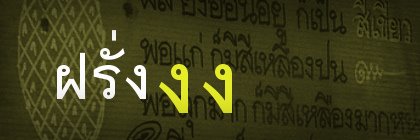มลรัฐเวอร์มอนต์ (Vermont) เป็นมลรัฐในสหรัฐอเมริกาตั้งอยู่ทางตะวันออกของประเทศ อยู่ในเขตนิวอิงแลนด์ ในอดีตรัฐเวอร์มอนต์เป็นที่อยู่อาศัยของอินเดียนแดงเผ่าอิโรควอยส์ เผ่าอัลกอนเควียน และเผ่าอเบนากิ โดยทางฝรั่งเศส*ได้ยึดครองมาในช่วงตั้งรกรากในสหรัฐอเมริกา และได้เสีย*ให้กับอังกฤษในช่วงสงครามในเวลาต่อมา
รัฐเวอร์มอนต์มีชื่อเสียงในด้านของวิวทิวทัศน์ที่สวยงาม และเป็นแหล่งท่องเที่ยวที่สำคัญแห่งหนึ่งรวมถึง*** สกีรีสอร์ตที่สำคัญหลายแห่ง**** เวอร์มอนต์ยังคงมีชื่อเสียงในด้านผลิตภัณฑ์จากวัวและเมเปิลไซรัป เมืองหลวงของรัฐคือ มอนต์เพเลียร์ และเมืองที่ใหญ่ที่สุดในรัฐคือ เบอร์ลิงตัน
ในปี 2550 เวอร์มอนต์มีประชากร 621,254 คน[1]
Things I learned from the Thai wikipedia page on Vermont:
- Native Americans are called Red "Indian"s, อินเดียนแดง.
- I can read short Thai wikipedia pages without much difficulty! Holy shit!
Seriously, there were only a (large) handful of words I didn't get:
อดีต -former, previous
ยึดครอง -occupy, take possession of forcefully.
รกราก -residence
ดั้งรกราก -settle down, take up residence
ได้เสีย -gain and lose (interesting combination of two common words)
(วืว)ทิวทัศน์ -scenery
แหล่งท่องเที่ยว -Tourist location
รวมถึง -include
ผลิตภัณฑ์ -product/merchandise
Here is a stab at translating the entry. This is no doubt riddled with errors.
Vermont is a state in the United States, in the northeast part of the country. It's in the region of New England. In the past Vermont was home to the Native American tribes Iroquois, Algonquin, and Abenaki. France* occupied it during the establishment of the United States and lost it** to the English during the war afterwards.
Vermont is famous for its beautiful scenery and one important tourist location*** is the many ski resorts.**** Vermont remains famous for its dairy products* and "maple syrup". The capital of the state is Montpelier and the largest city is Burlington.
In the year 2007 Vermont had a population of 621,254.
*I'm not quite sure how to parse โดยทาง. I know the words, but the structure confuses me. I'm going to assume it basically means "by"- I think it says "By France it was occupied" but there's no passive marker.
**While ได้เสีย has the interesting "lose and gain" translation, on second look I'm assuming that ได้ is marking aspect, to match the previous clause's ได้ยึดครอง.
*** First time around I neglected to realize that แห่ง was a classifier (for locations).
**** This sentence took me a while to crack. (If I even have.)
* Literally "products from cows." A similar word is ผลิตภัณฑ์นม, "products from milk". I have no clue what difference in meaning they have.
